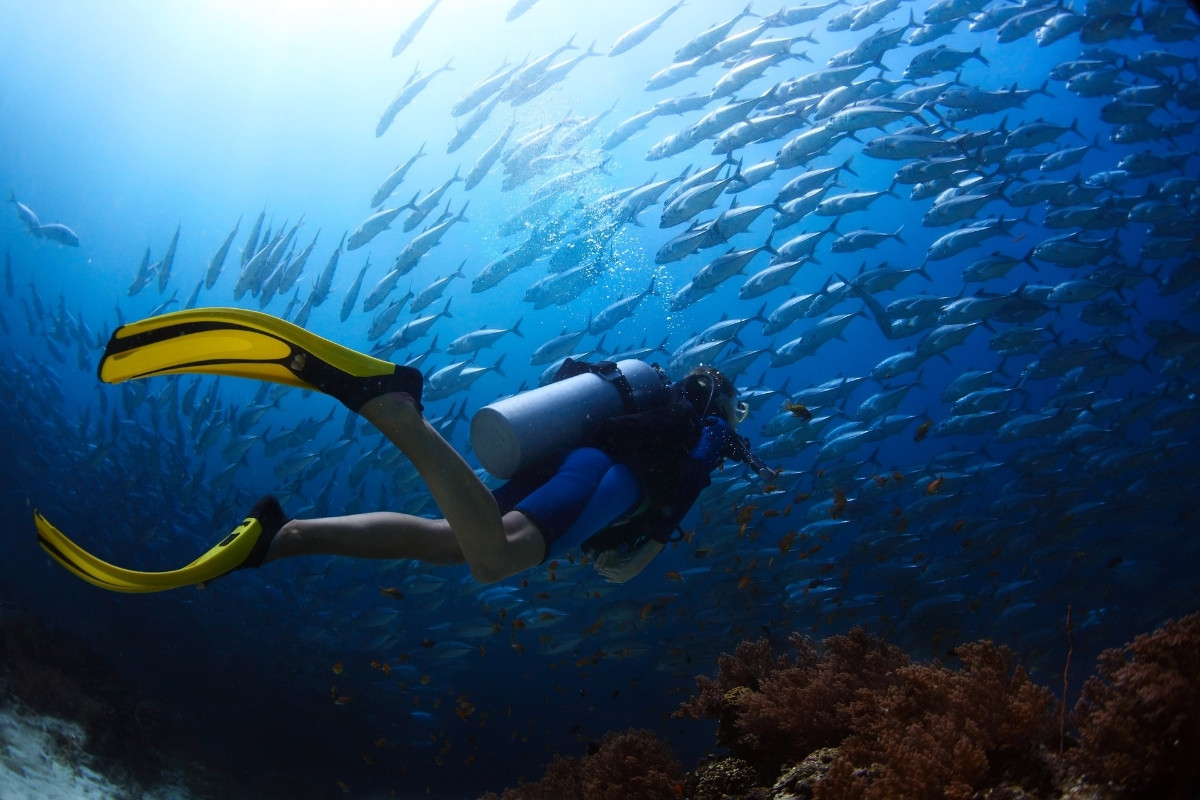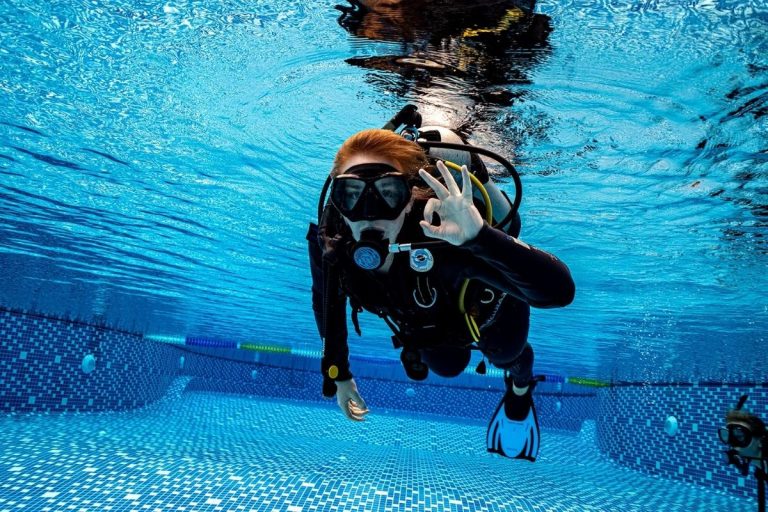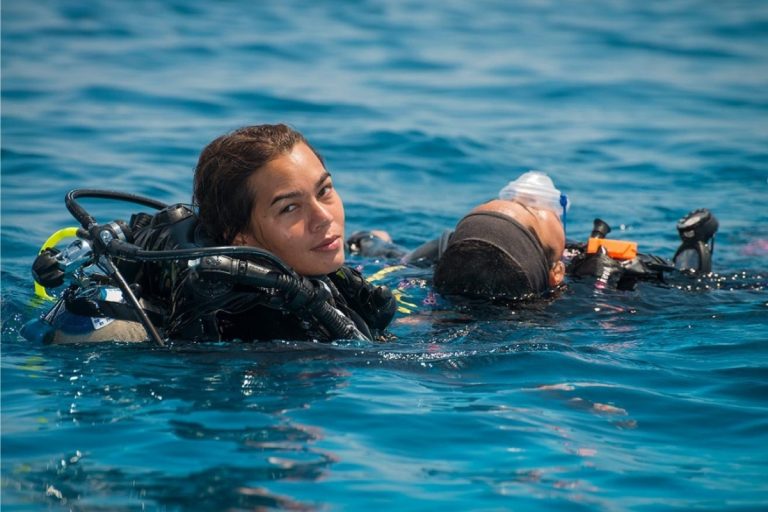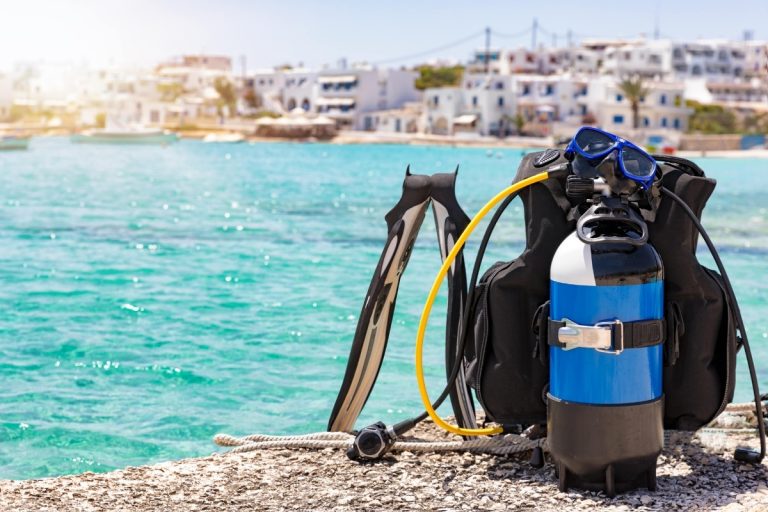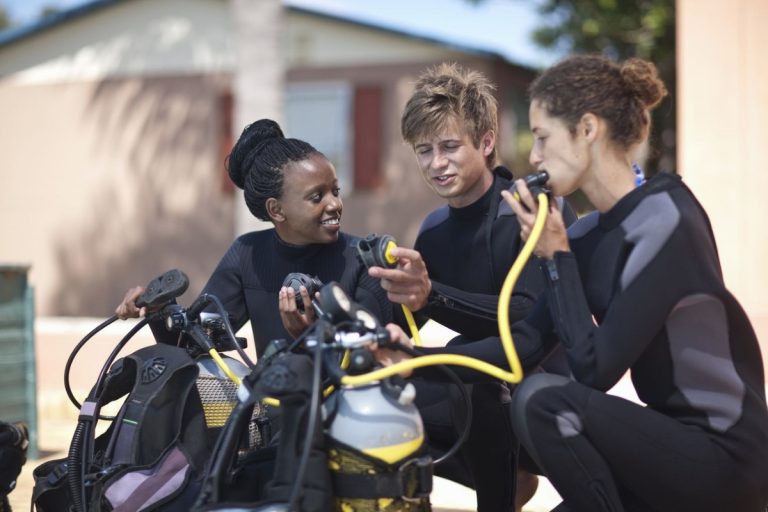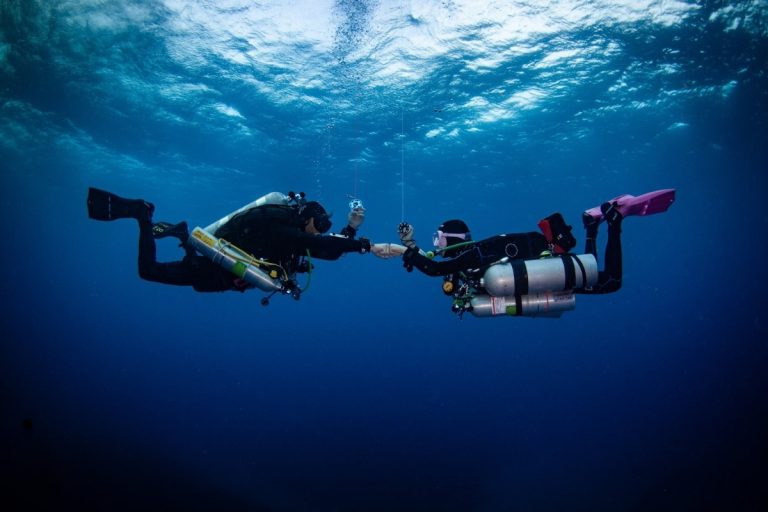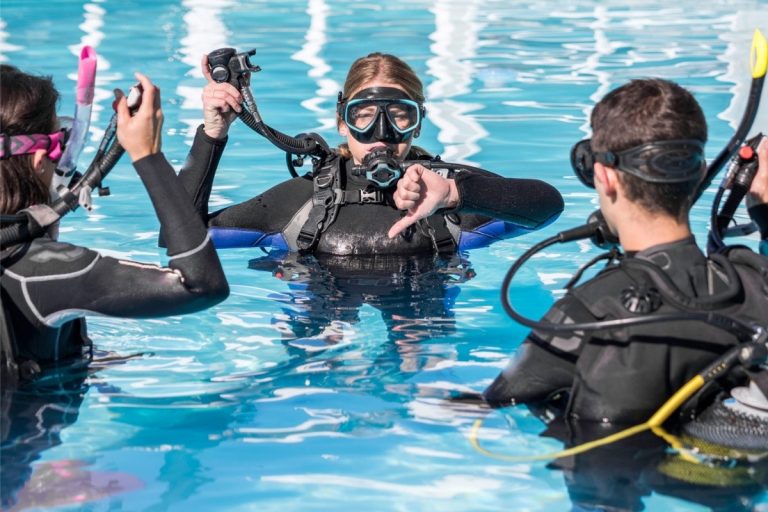- Overview of Advanced Adventure Dives
- Course Structure and Requirements
- Mandatory Dives in the Course
- Specialty Dives Options
- Skills Development in Advanced Dives
- Dive Travel and Booking Options
- Conservation and Environmental Awareness
- Continuing Education Opportunities
- Frequently Asked Questions
- Embarking on Your Advanced Diving Journey
Overview of Advanced Adventure Dives
The world of scuba diving opens up dramatically once you move beyond your basic certification. Advanced adventure dives represent a significant step forward in your underwater journey, offering experiences that transform casual divers into confident underwater explorers. These specialized dives introduce you to environments and techniques that were previously off-limits, from exploring mysterious shipwrecks to navigating through the darkness of night waters.
Advanced adventure diving isn’t just about going deeper or staying longer underwater. It’s about developing the skills and confidence needed to handle diverse underwater conditions while maintaining safety as your top priority. Whether you’re drawn to the technical challenges of deep diving or the serene beauty of night diving, these advanced experiences will fundamentally change how you interact with the underwater world.
The progression from basic open water certification to advanced adventure diving represents more than just additional training. It marks your evolution from a tourist underwater to someone who truly understands and respects the marine environment. This transformation opens doors to dive sites around the world that were previously beyond your certification level.
What are Advanced Adventure Dives?
Advanced adventure dives encompass a range of specialized diving activities that go beyond basic open water skills. These dives introduce you to specific environments, techniques, and equipment that require additional training and certification. Each type of adventure dive focuses on particular skills and knowledge areas that enhance your overall diving competency.
The beauty of advanced adventure dives lies in their diversity. You might find yourself exploring a sunken vessel one day and practicing underwater navigation the next. This variety keeps your diving experiences fresh and challenging while building a comprehensive skill set that serves you well in any underwater situation.
Importance of Certification in Diving
Proper certification isn’t just a piece of plastic in your wallet. It represents verified competency in specific diving skills and knowledge areas that could literally save your life underwater. Certification programs are designed by diving professionals who understand the real-world challenges and risks associated with different types of diving activities.
When you pursue advanced certifications, you’re not just meeting industry requirements. You’re investing in your own safety and the safety of your diving companions. Certified divers are statistically safer divers, and this safety record is what allows the diving industry to maintain access to incredible dive sites around the world.
Overview of the PADI Advanced Open Water Diver Course
The PADI Advanced Open Water Diver course serves as the gateway to advanced adventure diving for millions of divers worldwide. This comprehensive program combines theoretical knowledge with practical underwater experience, ensuring you develop both the understanding and skills needed for advanced diving activities.
What sets this course apart is its flexibility and practical approach. Rather than spending weeks in a classroom, you learn by doing. Each dive in the program serves a dual purpose: it’s both a learning experience and an adventure. This hands-on approach helps you retain information better while building confidence through real underwater experiences.
Course Structure and Requirements
Understanding the structure and requirements of advanced diving courses helps you prepare properly and set realistic expectations for your training. The course prerequisites and medical requirements ensure that participants are physically and mentally prepared for the challenges of advanced diving. These requirements aren’t arbitrary barriers but carefully designed safety measures based on decades of diving experience and accident analysis.
The modular nature of advanced diving courses allows you to progress at your own pace while ensuring you master each skill before moving to the next level. This approach recognizes that different people learn at different rates and have varying comfort levels with different aspects of diving. The flexibility built into these programs makes advanced diving accessible to a wide range of people while maintaining rigorous safety standards.
Course completion requirements are designed to ensure you can demonstrate competency in real-world conditions, not just in controlled training environments. This practical focus means that when you complete your certification, you’re truly prepared for the types of diving adventures that await you.
Prerequisites for Enrollment
Before enrolling in advanced adventure diving courses, you must hold a basic open water certification from a recognized diving organization. This prerequisite ensures you have fundamental diving skills and knowledge before tackling more challenging underwater environments. Most programs also require a minimum number of logged dives to ensure you have practical experience beyond your initial certification.
Age requirements vary depending on the specific course and certification level. Junior certifications are available for younger divers, typically starting at age 12, though these come with additional restrictions and supervision requirements. Adult certifications generally begin at age 15 or 16, depending on the specific program and local regulations.
Required Dives and Specialty Options
Advanced diving courses typically include a combination of mandatory dives and elective specialty dives. The two universal requirements are deep diving and underwater navigation, as these skills form the foundation for most other advanced diving activities. These mandatory dives ensure all certified advanced divers share a common skill set regardless of which elective dives they choose.
The specialty dive options allow you to customize your training based on your interests and local diving opportunities. Popular choices include wreck diving, night diving, enriched air nitrox, underwater photography, and drift diving. This flexibility means your certification reflects not just advanced skills but also your specific diving interests and goals.
Age Requirements for Junior Certifications
Junior advanced certifications recognize that younger divers can safely participate in advanced diving activities with appropriate restrictions and supervision. These programs typically limit maximum depth and require adult supervision, ensuring young divers can enjoy advanced diving while maintaining additional safety margins.
The junior certification pathway provides a structured progression that allows young divers to build skills and experience gradually. As they mature and gain experience, junior divers can upgrade to full adult certifications, removing the restrictions while maintaining the skills they’ve developed.
Mandatory Dives in the Course
The two mandatory dives in advanced open water courses serve as the foundation for all other advanced diving activities. Deep diving and underwater navigation represent core competencies that every advanced diver must master. These skills are so fundamental to safe advanced diving that they’re required regardless of what other specialty areas interest you.
The mandatory dive requirements ensure consistency across the diving community. When you meet another advanced open water diver anywhere in the world, you can be confident they possess these essential skills. This standardization is crucial for dive planning and buddy selection when traveling or diving in unfamiliar locations.
The Deep Dive Experience
Deep diving introduces you to the unique challenges and rewards of descending beyond recreational depth limits. During your deep dive training, you’ll learn to recognize and manage the effects of nitrogen narcosis, understand how color absorption changes with depth, and practice emergency procedures specific to deeper waters.
The deep dive experience is often a revelation for new advanced divers. Colors that appear vibrant at shallow depths fade to blues and grays as you descend, while the increased pressure affects your buoyancy and air consumption. Learning to manage these changes while maintaining situational awareness is a crucial skill that transfers to many other diving activities.
Safety procedures for deep diving require special attention to ascent rates, safety stops, and air management. The reduced margin for error at depth means that good planning and execution become even more critical. These lessons in precision and planning serve you well in all future diving activities.
Underwater Navigation Techniques
Underwater navigation transforms you from someone who follows dive guides to a diver capable of independent exploration. Natural navigation techniques help you use environmental cues like sand ripples, coral formations, and light patterns to maintain your bearings underwater. These skills prove invaluable when diving in low visibility conditions or unfamiliar locations.
Compass navigation provides a reliable backup to natural navigation techniques and allows for precise navigation over longer distances. Learning to use an underwater compass effectively requires practice, but once mastered, it opens up possibilities for self-guided diving adventures and helps ensure you can always find your way back to your entry point.
Specialty Dives Options
The specialty dive portions of advanced courses allow you to sample different areas of diving specialization. These experiences help you identify which aspects of diving most appeal to you while building a diverse skill set. The specialty courses including Enriched Air and Wreck Diving represent some of the most popular choices among advancing divers, each offering unique challenges and rewards.
Each specialty dive provides a taste of what full specialty certification would involve. This sampling approach helps you make informed decisions about which specialty areas to pursue for full certification while ensuring your advanced certification includes practical experience in multiple diving disciplines.
Overview of Enriched Air Nitrox
Enriched air nitrox diving uses breathing gas with higher oxygen content than normal air, allowing for longer bottom times and shorter surface intervals. This specialty has become increasingly popular as divers recognize the benefits of extended underwater time, especially on dive trips where you want to maximize your underwater experiences.
Learning to dive with enriched air requires understanding oxygen toxicity, gas analysis procedures, and modified dive planning techniques. While the concepts are straightforward, the precision required for safe nitrox diving teaches valuable lessons about gas management and dive planning that benefit all your future diving activities.
The practical benefits of nitrox become apparent immediately. Longer bottom times mean more opportunities to observe marine life, practice photography, or simply enjoy the underwater environment. Shorter surface intervals allow for more dives per day, making dive trips more productive and enjoyable.
Exploring Wreck Diving
Wreck diving combines history, adventure, and technical challenge in uniquely compelling ways. Sunken ships, aircraft, and other artificial reefs create fascinating underwater landscapes while providing homes for diverse marine communities. Learning to safely navigate these environments requires specialized skills and safety procedures.
Wreck diving safety focuses heavily on avoiding entanglement and maintaining clear exit routes. The overhead environment of ship interiors requires careful buoyancy control and situational awareness. These skills transfer well to other challenging diving environments like caves and caverns.
The historical aspect of wreck diving adds depth to the experience beyond just the diving itself. Learning about the vessels you’re exploring and understanding their role in maritime history creates a connection that makes each dive more meaningful and memorable.
Night Diving Essentials
Night diving reveals an entirely different underwater world as nocturnal marine life emerges and daytime creatures seek shelter. The experience of diving in darkness challenges your comfort zone while teaching valuable skills in light management, buddy communication, and navigation in limited visibility conditions.
Proper lighting equipment becomes crucial for night diving safety and enjoyment. Primary lights, backup lights, and signaling devices each serve specific purposes, and learning to use them effectively requires practice and understanding. The interplay between artificial lighting and natural bioluminescence creates magical underwater moments unique to night diving.
Navigation techniques for night diving rely heavily on compass work and careful attention to depth and time, as visual references become limited. These skills prove valuable in any low-visibility diving situation, making night diving training beneficial beyond just nighttime adventures.
Skills Development in Advanced Dives
Advanced diving courses focus heavily on refining fundamental skills while introducing new techniques specific to challenging environments. The emphasis on skill development recognizes that advanced diving situations leave less room for error, making precision and competency more critical than ever. Each skill builds upon your existing foundation while preparing you for the unique demands of advanced diving activities.
The progressive nature of skill development in advanced courses ensures you’re never overwhelmed by too many new concepts at once. Instead, you build competency systematically, with each new skill reinforcing and expanding upon previously learned techniques. This approach creates confident, capable divers who can handle unexpected situations with composure and skill.
Buoyancy Control Techniques
Perfect buoyancy control becomes even more critical in advanced diving situations. Whether you’re navigating through a wreck or maintaining position for underwater photography, precise buoyancy control makes the difference between a successful dive and a frustrating struggle. Advanced courses emphasize fine-tuning your buoyancy skills to achieve effortless underwater movement.
Peak performance buoyancy techniques focus on breath control, weight distribution, and equipment streamlining. These skills not only improve your diving experience but also reduce air consumption and minimize environmental impact. The confidence that comes from perfect buoyancy control enhances every aspect of your diving.
Breathing and Positioning in Water
Efficient breathing techniques become more important as you face the increased demands of advanced diving environments. Learning to control your breathing rate and depth helps manage air consumption while maintaining calm in challenging situations. Proper breathing also supports good buoyancy control and reduces fatigue during longer or more demanding dives.
Body positioning in water affects everything from air consumption to navigation accuracy. Advanced courses teach you to maintain proper trim and positioning for different diving activities, whether you’re swimming through a wreck or hovering motionless for photography. These positioning skills reduce effort while improving your effectiveness underwater.
Introduction to Underwater Photography
Underwater photography combines technical diving skills with artistic vision, creating a specialty that appeals to many advanced divers. The basics of underwater photography introduce concepts of lighting, composition, and camera handling in the challenging underwater environment. Even if photography isn’t your main interest, these skills improve your observation abilities and underwater awareness.
Camera handling underwater requires modified techniques for buoyancy control and movement. Learning to operate camera equipment while maintaining proper diving form teaches valuable lessons in task management and situational awareness that transfer to other diving activities requiring equipment manipulation.
Dive Travel and Booking Options
Advanced certification opens up diving opportunities around the world that were previously beyond your reach. Understanding how to research, plan, and book advanced diving trips ensures you can take full advantage of your new capabilities while maintaining safety and maximizing enjoyment. The world of advanced dive travel offers experiences ranging from accessible local adventures to exotic international expeditions.
Proper trip planning becomes more important as you tackle more challenging diving environments. Advanced dives often require specific equipment, weather conditions, or seasonal timing, making careful research and planning essential for successful trips. Understanding these requirements helps you choose appropriate destinations and prepare properly for your adventures.
Choosing the Right Dive Destination
Selecting appropriate dive destinations requires matching your certification level and experience with site requirements and conditions. Advanced open water certification opens access to many exciting sites, but some locations may require additional specialty certifications or experience levels. Researching destination requirements ensures you can participate fully in planned activities.
Environmental conditions play a crucial role in destination selection. Water temperature, visibility, currents, and seasonal variations all affect diving conditions and required equipment. Understanding these factors helps you pack appropriately and set realistic expectations for your diving experiences.
Booking Your Dive Trip
Professional dive operators provide valuable services for advanced diving trips, from equipment rental to local site knowledge. Choosing reputable operators ensures safety standards are maintained while maximizing your diving opportunities. Reading reviews and checking certifications helps identify operators who can support your advanced diving goals.
Trip timing can significantly impact your diving experience, especially for seasonal activities like whale watching or specific marine life encounters. Understanding optimal timing for your chosen destination helps ensure you experience the best possible conditions and marine life opportunities.
PADI Travel Options and Benefits
PADI travel programs offer structured options for continuing your diving education while exploring new destinations. These programs combine adventure travel with skill development, allowing you to earn specialty certifications while experiencing world-class diving locations. The combination of education and adventure makes these programs appealing to many advancing divers.
Membership benefits through programs like PADI Club provide discounts on travel, equipment, and continuing education. These benefits can significantly reduce the cost of pursuing advanced certifications and diving adventures, making continued diving education more accessible and affordable.
Conservation and Environmental Awareness
Advanced divers bear greater responsibility for marine conservation as their skills allow access to more pristine and vulnerable environments. Understanding your impact and actively participating in conservation efforts becomes an integral part of advanced diving. The knowledge and skills gained through advanced training position you to be an effective advocate for marine protection.
Environmental awareness in advanced diving extends beyond basic “look but don’t touch” principles to encompass understanding ecosystem relationships, recognizing environmental threats, and taking active steps to minimize your impact. This deeper understanding enhances your diving experience while contributing to the preservation of the underwater environments you love to explore.
PADI AWARE Initiatives
PADI AWARE programs provide structured opportunities for divers to contribute to marine conservation efforts. These initiatives range from citizen science projects to direct conservation actions, allowing divers to use their underwater access for positive environmental impact. Participating in AWARE programs connects your diving passion with meaningful conservation work.
Project AWARE focuses on critical ocean issues like marine debris and shark conservation. Advanced divers are particularly well-positioned to contribute to these efforts through their access to diverse marine environments and their enhanced observation skills. Your participation helps generate valuable data while making a real difference for ocean health.
Participating in Ocean Preservation
Individual actions by advanced divers collectively create significant positive impact for marine environments. Simple practices like proper buoyancy control to avoid reef damage, responsible wildlife observation, and participating in cleanup dives contribute to ocean preservation. These actions demonstrate the diving community’s commitment to protecting the environments we enjoy.
Advanced divers can serve as ambassadors for marine conservation, sharing their experiences and knowledge with others. Your underwater observations and experiences provide powerful stories that help others understand the importance of ocean protection. This advocacy role extends your positive impact far beyond your individual diving activities.
The Importance of Marine Conservation for Divers
Marine conservation isn’t just an abstract concept for advanced divers; it’s essential for preserving the environments that make advanced diving possible. Healthy marine ecosystems support the diverse wildlife and pristine conditions that create memorable diving experiences. Your investment in conservation helps ensure these opportunities remain available for future generations.
Understanding the connections between human activities and marine health helps advanced divers make informed choices about their diving practices and lifestyle decisions. This knowledge empowers you to be part of the solution to marine environmental challenges while enjoying the incredible experiences that advanced diving provides.
Continuing Education Opportunities
Advanced open water certification represents just the beginning of your diving education journey. The skills and confidence gained through advanced training prepare you for even more specialized and challenging diving activities. Understanding the pathways for continued education helps you plan your diving development and set goals for future achievements.
The rescue diver and divemaster training programs represent natural next steps for many advanced divers, offering opportunities to develop leadership skills while deepening your diving knowledge. These programs transform you from an advanced recreational diver into someone capable of helping others and potentially pursuing diving as a career.
Advancing Beyond the Advanced Open Water Diver
Specialty certifications allow you to develop expertise in specific areas of diving that most interest you. Whether you’re drawn to technical diving, underwater photography, or marine biology, specialty programs provide structured pathways for developing advanced skills in your chosen areas. These certifications often serve as prerequisites for even more advanced training programs.
The modular nature of diving education allows you to customize your training path based on your interests, available time, and diving goals. This flexibility means you can continue learning and growing as a diver throughout your diving career, always finding new challenges and opportunities for development.
Rescue Diver Course Overview
Rescue diver training transforms your perspective on diving safety and emergency management. This course teaches you to recognize and respond to diving emergencies, both preventing problems and managing them when they occur. The skills learned in rescue training benefit every aspect of your diving while preparing you to help others in emergency situations.
The psychological aspects of rescue training are as important as the physical skills. Learning to remain calm under pressure, make quick decisions, and manage stress benefits all your diving activities. These mental skills prove valuable in many life situations beyond diving, making rescue training a worthwhile investment in personal development.
Becoming a Divemaster
Divemaster certification represents the first professional level in diving education, opening opportunities for working in the diving industry while developing advanced leadership and teaching skills. The program combines advanced diving skills with knowledge of dive theory, physics, and physiology, creating well-rounded diving professionals.
The mentorship aspect of divemaster training provides valuable experience working with newer divers while refining your own skills. This teaching experience deepens your understanding of diving principles while developing communication and leadership abilities that serve you well in many contexts beyond diving.
Frequently Asked Questions
What is the purpose of advanced adventure dives?
Advanced adventure dives aim to enhance divers’ skills and confidence in diverse underwater conditions, allowing for exploration of deeper waters, wrecks, and night diving.
What certification is needed to enroll in advanced diving courses?
A basic open water certification from a recognized diving organization is required to enroll in advanced adventure diving courses.
What are the mandatory dives in advanced open water courses?
The mandatory dives are deep diving and underwater navigation, which are core competencies every advanced diver must master.
What are some popular specialty dive options?
Popular specialty dive options include wreck diving, night diving, enriched air nitrox, underwater photography, and drift diving.
How does advanced diving contribute to marine conservation?
Advanced divers are encouraged to participate in conservation efforts and understand their impact on marine ecosystems, making them advocates for marine protection.
Embarking on Your Advanced Diving Journey
As you consider advancing your diving skills, remember that the journey is about more than just exploration; it’s about safety, environmental stewardship, and personal growth. Embrace the opportunities that advanced adventure dives provide, and prepare to experience the underwater world like never before.
